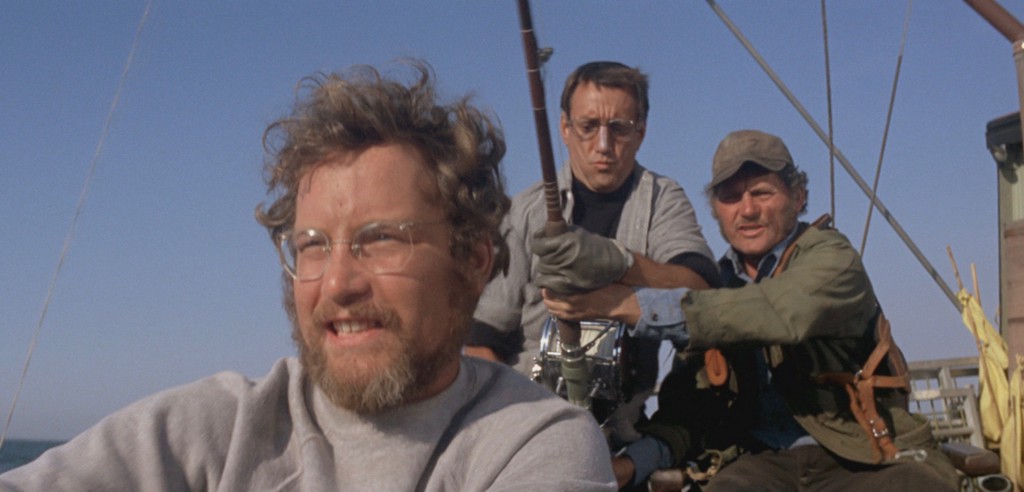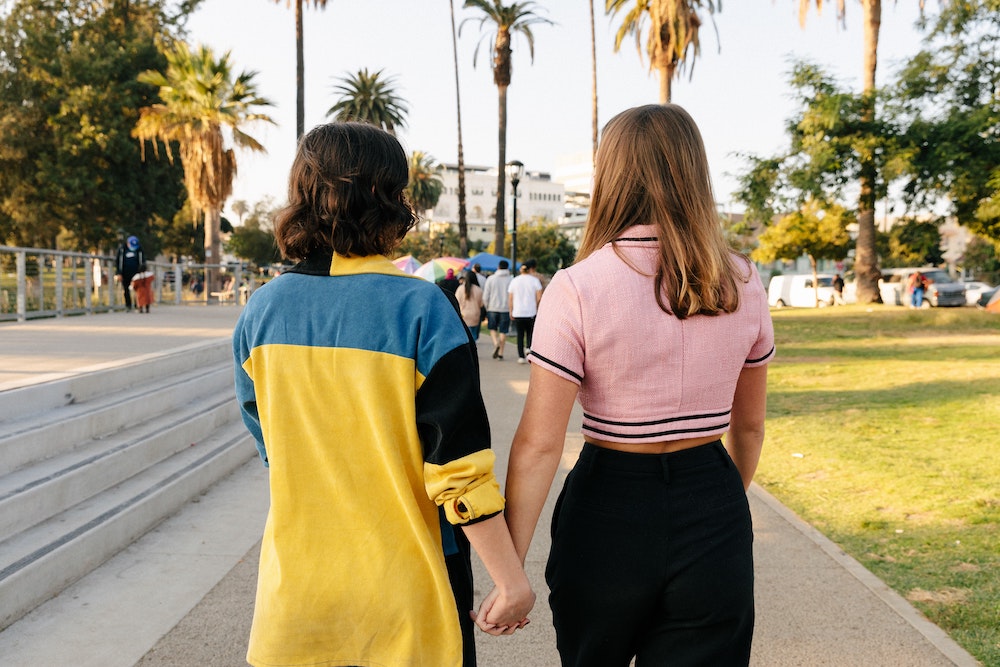Books & Culture
‘Jaws’ is a Film Full of Queer Intimacy You Never Noticed
How three men on a boat helped me come to terms with my sexuality

I ’ve known that I like women since my Sporty Spice obsession at age six, but the feeling was one that I’d mostly ignored until I watched Jaws. My dad gave me a Target gift card for my twelfth birthday, and while shopping for my own present, I was drawn to the blue, metallic sheen of the double-VHS 25th Anniversary Collector’s Edition. The cover image was iconic: a blonde woman swimming naked, an enormous circle of teeth reaching up from the depths, the name of the film in blaring red letters. It seemed scary, dangerous, and a little bit sexy. I watched it perched on the edge of my bed. I was enamored with the elusiveness of the shark, how you couldn’t always see it but you knew it was there. I laughed at the jokes and tensed up at the scary parts, shrieking when Ben Gardner’s head rolled out of the broken hull of his boat. The movie overwhelmed me with feelings I’d never had before, one of which was a breathless tingle in my abdomen, a trembling that excited me as I watched Brody, Hooper, and Quint cooperate, laugh, and argue on the boat.
In the mainstream, queerness is tolerated when masked with straight performance, or an appearance that could be coded as straight. Queer films like Fried Green Tomatoes are widely enjoyed in part because it’s possible to read them as straight. Likewise, Jaws is a straight film that can be read as queer, and this is the reading I choose.
People don’t read me as queer either. I have only come out to a couple members of my family. My brother knows, and when I told my father when I was a teenager, he said, “Okay,” and we never spoke of it again. Coming out to my grandmother is out of the question.
It was more than a decade ago that she made her pronouncement. I was driving her home from grocery shopping, the backseat brimming with food. The whoosh of the air conditioning flapped the plastic bags, fwip-fwip-fwip. The lettuce wilted in the heat, and the carton of ice cream sweat icy droplets.
“Being gay is fine,” she said. “A person can’t help that. But being bisexual is gross. Just pick one! You shouldn’t double-dip.” I imagined myself as a broccoli floret, dunked twice into a tub of French onion dip at a party.
“Why is that gross?” I asked. I pressed the accelerator, and my grandmother grabbed the door.
“Would you want to have sex with a man who has had sex with another man?”
I had begun to see queerness everywhere, in myself and in others, in real life, in books, in movies.
I didn’t answer. I couldn’t answer. At that age, I had begun to see queerness everywhere, in myself and in others, in real life, in books, in movies. I looked for it as if finding it would help me decode the puzzle of my own sexuality.
I haven’t had to come out to my grandmother because all my partners who stuck around long enough to be invited to Thanksgiving dinner have been men. I am able to hide my queerness, a privilege that is convenient and gives me safety that some other queer orientations don’t have. Yet there is a guilt nestled underneath that relief, a sense that I am not participating. By not coming out and declaring myself, I have the clinging feeling that I am not being queer enough.
Jaws is can be read as queer even though the men don’t “look” queer to an outside eye. My queer reading stems from two aspects of covert communication: the gaze and innocuous touch, both classic indicators of desire. Historically, queer interactions were dangerous — and often still are. The looks and touches between the men in the film signal an intimacy that is easy to overlook, particularly when the touches occur in jest; in the midst of arguing with Mayor Vaughn about the seriousness of the situation, Hooper places his hands on Brody’s stomach and pats him to punctuate his irritation. It’s easy to orchestrate these touches so that they seem natural, because the characters are often standing in close proximity to one another. Spielberg frames the water and the characters in the same way, very close. The technique makes their bodies and faces take up the screen. The distance between the men seems negligible, the possibilities endless.
This moment of vulnerability is the climax to the explorations of their bodies, because even homoerotic touch is less intimate than the baring of Quint’s trauma.
Touching hands is significant in queer intimacy. As with the examples mentioned above, it is a touch that is erotic yet can easily be perceived as casual. Upon meeting for the first time, Quint says to Hooper, “Let me see your hands.” He takes Hooper’s hands in his and pulls Hooper toward him. The contrast between Quint’s hands and Hooper’s is an analysis of class (Quint claims Hooper has “city hands” and it’s obvious from his hands he’s “had money all [his] life”), but it is also a touch that is personal. By examining Hooper’s hands, Quint is examining Hooper and his history.
Closeness between the men’s bodies becomes even more pronounced when they board The Orca, Quint’s fishing boat aptly (or ironically) named for she shark’s only natural predator. The small space of the boat and the great nothingness of the sea requires the men to remain physically close. The greatest moment of intimacy occurs at night when the work has stopped, and they are drinking inside the boat. Hooper and Quint compare scars. Quint shows a fake tooth and then leans across the table so Hooper can touch a lump on his head. Hooper reveals a jagged scar on his arm from a moray eel. Quint rolls up his sleeve to show Hooper he can’t extend his bicep all the way. Hooper scoots along the booth closer to Quint, rolls up his pant leg, and stretches his leg out to display a scar on his calf. He places his leg on Quint’s hand, and Quint turns to Brody off screen and grins. Quint rubs Hooper’s leg playfully and then moves closer, rolling up his own pant leg and placing it over Hooper’s to present a scar from a thresher’s tail. Brody, standing off to the side, asks, “Thresher?” and Hooper, annoyed, explains that a thresher is a shark, a move that subtly excludes Brody. Quint and Hooper look at each other and smile, an inviting look I cannot read as anything other than erotic. Quint asks Hooper if he wants to drink, and Hooper says they’ll drink to each other’s legs. As they cackle and down their alcohol, Brody lifts up his shirt to show his own scar. He pauses, as if he’s considering inserting himself into the intimate exchange, and ultimately decides against it.
The one-upping of scars is a safe form of touch. It’s a competition, but it’s also a test of boundaries, both physical and emotional, and the climax of this intimacy among the three men is Quint’s famous monologue where he describes the horrifying experience of surviving the greatest US naval disaster in history. The root of Quint’s obsessive sharking is revealed as he describes waiting three days in the water, dehydrated and starving, warding away the frenzied sharks that dragged the sailors away one by one. This moment of vulnerability is the climax to the explorations of their bodies, because even homoerotic touch is less intimate than the baring of Quint’s trauma.
As a child, I always wanted to touch my girl friends. Playful touch was a way I could explore my relationship to other girls and the feelings that came with it, but only if it did not cross a line — a line I didn’t always see. My grandmother came to pick me up from soccer practice when I was in first grade. She waited in her car next to the field. A girl named Jessie and I ran across the grass, spanking each other and laughing hysterically. When I reached my grandmother’s car I said goodbye to Jessie and climbed in. “What the hell were you doing?” my grandmother hissed. “Running around spanking each other like that. What will Jessie’s mother think of you?” I sat silently in the backseat and tried not to cry, letting the shame wash over me, shame I hadn’t even known I should have.
I’ve been told that I am like a piece of spaghetti: straight until wet, my orientation whittled down to a joke. Or that I wasn’t really bisexual, just horny. I am, in other words, straight until proven gay.
Viewers may be tempted to write off the queer intimacy between Brody, Hooper, and Quint because of their history of straight relationships. Brody is married to a woman and has two children and Hooper makes a passing joke about an ex-girlfriend; some might point to these details as evidence of their straightness, as if there’s only gay or straight, and no way to exist outside of that dichotomy.
Using sexual history as the sole indicator of orientation is detrimental and damaging, and it’s why I struggle with my pansexuality, often feeling guilty for calling myself queer while not being more queer. I’ve not been with many women, and for some, this means my queerness is not valid. People, mostly straight men, have made comments like, “You’re not bisexual, you’re just bi-curious,” or “You just kiss girls because it makes guys interested in you.” I’ve also been told that I am like a piece of spaghetti: straight until wet, my orientation whittled down to a joke. Or that I wasn’t really bisexual, just horny. I am, in other words, straight until proven gay. These are all small things when they are looked at in isolation, but when examined together, they become a series of moments that attempt to delegitimize my identity.
Homosexuality is constantly contrasted with heterosexuality as if they are mutually exclusive. As a result, same-sex pairings are sometimes regarded as reactionary responses to heterosexuality not working out: lesbians date women because they hate men or because they experienced trauma at the hands of men and can now only feel safe with women, or men sleep with other men when there aren’t women around (think prison stereotypes). Culture works to delegitimize queerness, to rationalize away the gay. In the context of Jaws, homoeroticism can flourish because women are taken out of the equation. But the implication isn’t that the men are sexually drawn to one other due to a lack of women, (Hooper and Brody have undeniable chemistry throughout the film, even at the dinner table with Brody’s wife), but rather, eroticism is given room to grow because the experience is not continually contrasted with straightness. The men are isolated from expectation, from the civilization that is Amity Island, and all that exists is themselves.
Our sensuality was a sort of performance art: although we were there, making love in front of our male friends, the sensations I felt with her were intimate and invisible.
Many of my sexual experiences with women as a young adult were within threesomes that included a man. While it disgusts me now to think about my queer desire as fuel for a straight man’s fantasy, the context of threesomes provided a “safe” way of exploring my love of women. There was a security in pretending that making love to a woman was really just me catering to what the man wanted, and I freed myself of any responsibility I had to be “good” at lesbian sex. One night in college, I went down on a female coworker at a party in my apartment. I pushed her up against the wall and licked and tore at her body while the men watched. Our sensuality was a sort of performance art: although we were there, making love in front of our male friends, the sensations I felt with her were intimate and invisible.
In queer intimacy, the presence of a person of the opposite sex does not negate the sexual experience between the queer lovers. Likewise, having a wife or girlfriend in the case of Brody or Hooper does not make the characters straight. While we might wish to place Brody, Hooper, and Quint into neat categories, the on-screen evidence of the gaze, of touching, of standing so close together, points to a queer intimacy that refuses to be contained within the binary. The fact that there are three men instead of two is a subtle dismantling of the binary view of sexual orientations. There is a sexual power in threes in general, such as with the predominance of love triangles in narratives, and Jaws is no different, even if the love triangle isn’t explicit.
There is much written about the physical dangers of the pussy, particularly the mythical fanged pussy. The vagina dentata, a popular image in folklore, now runs rampant in horror films: the extraterrestrial monster in Alien, Audrey II in Little Shop of Horrors, the whole premise of Teeth. Jaws is another example that some people feel embodies this monstrous feminine presence. Like a mouth, the vagina is an organ that devours. I remember flipping through The Joy of Sex as a kid and reading a paragraph that described the vagina as frightening because it accepts the strong, masculine penis and then regurgitates it once it is limp and inert.
…the mouth is a reminder of the ever present hum of desires, of wanting, of pursuing things that might potentially harm or undo us entirely.
The vagina and the mouth bear similarities. Both can experience hunger and want, both can experience sensation, pleasure. Consuming food, having sex, chewing gum, masturbating, picking teeth with a tooth pick, all of these are responses elicited by the desires of the body. When I watch Jaws and see the beast’s dorsal fin pierce the water, I see the drive of desire, not the monstrous feminine. When the shark breaches the surface and grins its terrible grin as Brody chums the water, I feel exhilarated by its hunger. It is a similar feeling to the one I have when Hooper offers his leg to Quint or when Quint brushes up against Hooper in the narrow quarters of the boat. The mouth is not a feminine symbol come to destroy male camaraderie. Instead, the mouth is a reminder of the ever present hum of desires, of wanting, of pursuing things that might potentially harm or undo us entirely.
What I like about the sexuality in Jaws is the ambiguity. There’s an in-betweenness there in which the men are not gay nor straight but are instead neither or both. My place on the spectrum of sexual orientation doesn’t seem to stay in one spot. Sometimes I’m more attracted to men, sometimes I’m more attracted to women. Sometimes I’m attracted to nobody. Sometimes I’m attracted to all genders equally. Often, I feel the shame of being not queer enough. But I feel comfort watching Jaws and seeing characters that defy labels. It helps me check the impulse to use labels on myself that I know are false or incomplete.
There’s a particular moment in the film that brings me to tears each time. After Brody’s son goes into shock after witnessing the shark tear apart a fellow boater, Brody sits up and looks out at the water. The camera pauses on that shot, the strings of the score soaring as the great expanse of the ocean opens up in front of the viewer. The ocean is not just one thing. It is both the livelihood of the island and the destruction of it. It is both beautiful and terrifying. It is knowable and unknown. As Brody gazes out into forever, I think about how the sea is not just one thing, and neither am I.








